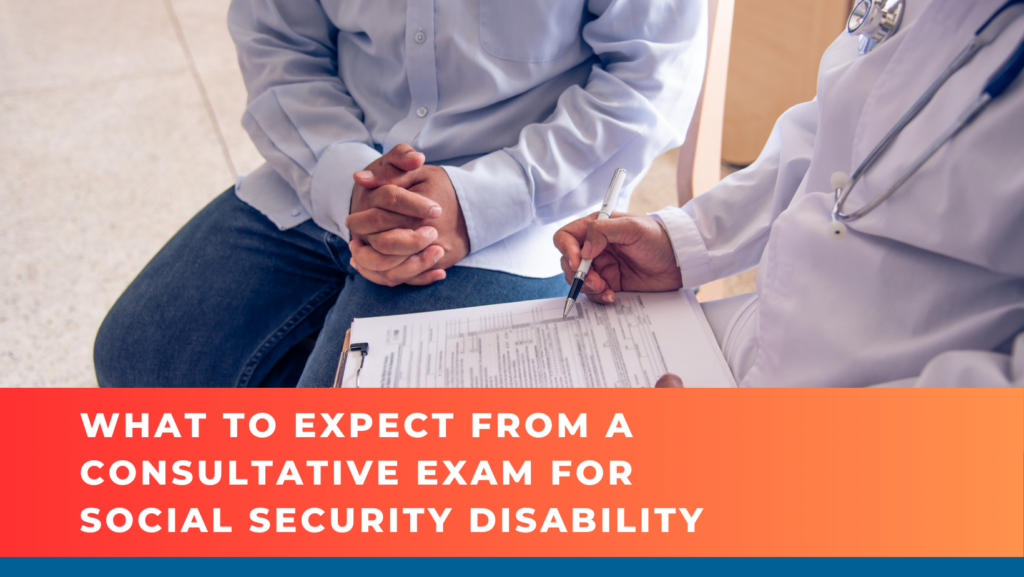When applying for Social Security Disability benefits, you may be required to attend a consultative exam. This exam helps the Social Security Administration (SSA) evaluate your physical and/or mental impairments to determine if they affect your ability to work. These exams, performed by doctors contracted with SSA, are often short but important steps in the application process.
Below, we’ll walk you through what to expect during both the physical and mental exams, how to prepare, and what SSA looks for in these evaluations.
What is a Consultative Exam?
A consultative exam is a medical evaluation requested by the SSA during your disability application process. If your medical records don’t provide enough information for SSA to make a decision, they may ask you to undergo this additional exam, which can focus on either your physical or mental health, or both.
The exam is not conducted by your personal physician but rather by a doctor hired by SSA to assess your condition. While the exam can be brief, it’s crucial to give your full effort and provide as much detail as possible about your symptoms and limitations.
Physical Consultative Exam: What Should You Expect?
A physical consultative exam focuses on assessing your physical impairments and how they impact your daily life and ability to work. Here’s what you need to know:
Preparing for the Physical Exam
Be ready to provide a thorough history of your medical treatment. This should include:
- Medications you take and their side effects
- Any surgeries, physical therapy, injections, or other medical procedures
- Any assistive devices you use
Bringing a timeline of your treatments and procedures can help you provide clear, organized information during the exam.
What Happens During the Physical Exam
The exam may be short, but it’s important to give your full effort throughout. The examiner will evaluate various aspects of your physical health, including: 
- Gait and station (your posture and the way you walk)
- Use of assistive devices (e.g., canes, walkers)
- Neurological function
- Strength (arms, legs, etc.)
- Range of motion
- Shoulders, hands, knees, and feet function
- Fine motor skills
- Deep tendon reflexes
- Tender points and a detailed examination of your back
During the exam, you may be asked about your daily activities. Be specific in explaining how your symptoms affect your ability to perform everyday tasks.
If the examiner fails to evaluate any of the above areas, be sure to contact your attorney immediately.
Mental Consultative Exam: What Should You Expect?
The mental consultative exam is designed to assess how your mental health issues affect your cognitive abilities and daily functioning. This exam is often a short-term memory test but covers other important aspects as well.
Preparing for the Mental Exam
Be ready to provide a history of your mental health treatment, including:
- Medications and their side effects
- Hospitalizations or inpatient treatments
- Counseling or therapy sessions
- Any invasive treatments (e.g., electroconvulsive therapy)
What Happens During the Mental Exam
During the exam, the doctor will ask about your daily activities and assess how your symptoms impact specific areas of mental functioning. Here are the key areas evaluated:
- Understanding, Remembering, and Applying Information
- Following instructions, both written and oral
- Describing your work activities
- Recognizing and solving problems
- Using judgment to make decisions
- Interacting with Others
- Cooperating with others and asking for help when needed
- Managing conflicts and communicating your thoughts effectively
- Handling social interactions without irritability or suspiciousness
- Concentrating, Persisting, and Maintaining Pace
- Starting and completing tasks in a timely manner
- Working without being distracted or needing excessive breaks
- Sustaining focus and a consistent pace throughout the workday
- Adapting or Managing Yourself
- Responding to work demands and changes
- Setting goals and managing symptoms
- Maintaining personal hygiene and being aware of workplace hazards
Be honest and clear about how your symptoms limit you in each of these areas.
How Long Until You Get a Decision?
After the consultative exam, the SSA typically makes a decision within six weeks. If additional information or exams are needed, this timeframe may be extended. If you haven’t heard back within that period, it’s a good idea to follow up with your attorney or SSA directly.
Conclusion:
How to Approach Your Consultative Exam
While consultative exams may seem daunting, proper preparation can help ensure your medical condition is accurately represented. Remember to provide detailed medical histories, give your full effort, and clearly explain how your symptoms impact your daily life and ability to work. If anything is overlooked during the exam, consult with your attorney to ensure your rights are protected.
By understanding what to expect and preparing thoroughly, you’ll increase your chances of receiving a favorable decision on your disability claim.
For more information about the Disability Process, here are some valuable resources:
- The Disability Process
- Consultative Examinations and Mental/Physical Exams
- Form SSA-16 | Information You Need to Apply for Disability Benefits
- Brochure: A Special Examination Is Needed for Your Disability Claim
- PDF: What You Should Know Before You Apply for Social Security Disability Benefits
- Disability Determination Process
- Apply Online for Disability Benefits
- Consultative Examination Guidelines
- Helpful Online Resources | Access to Information & Tools


